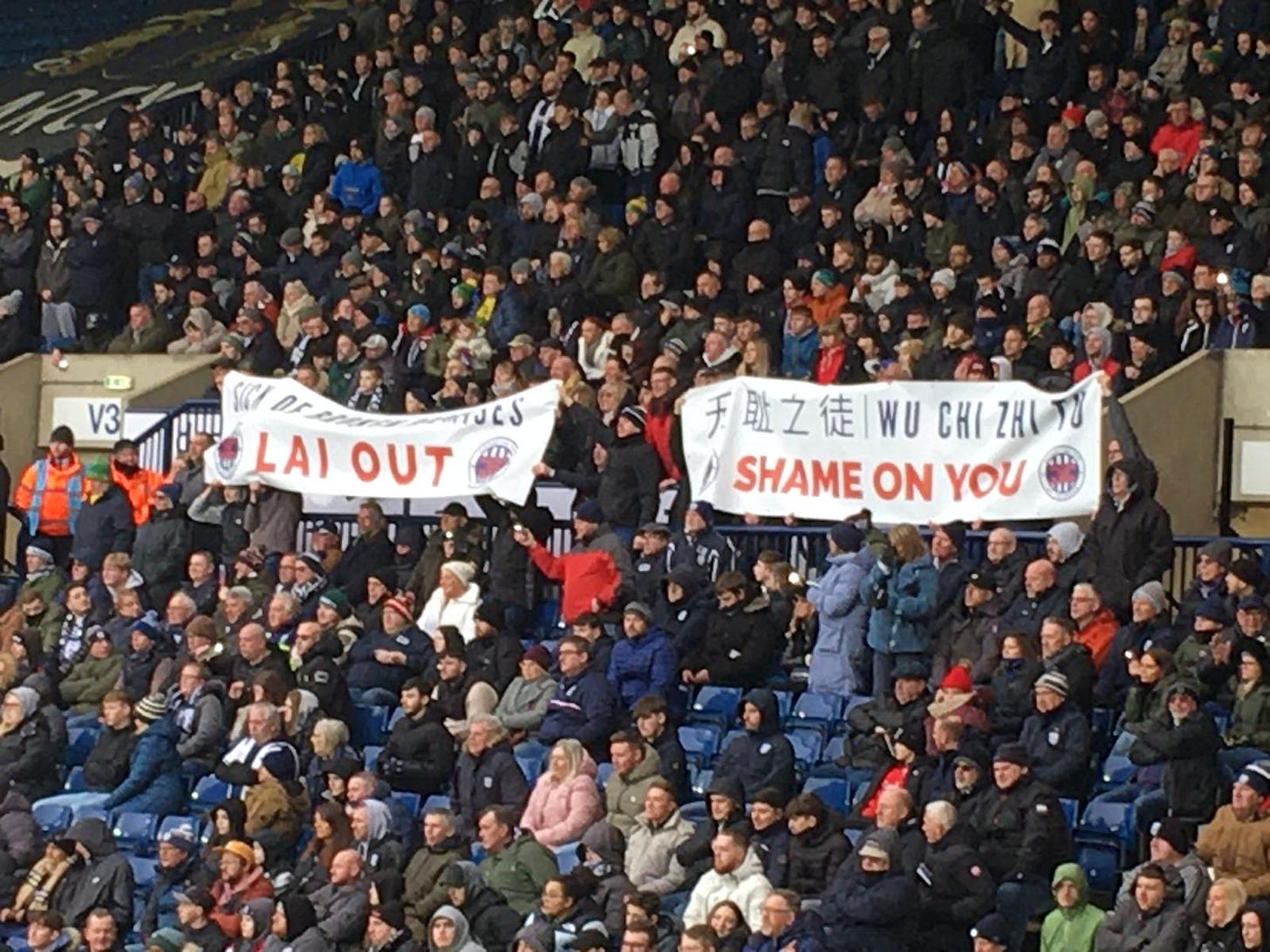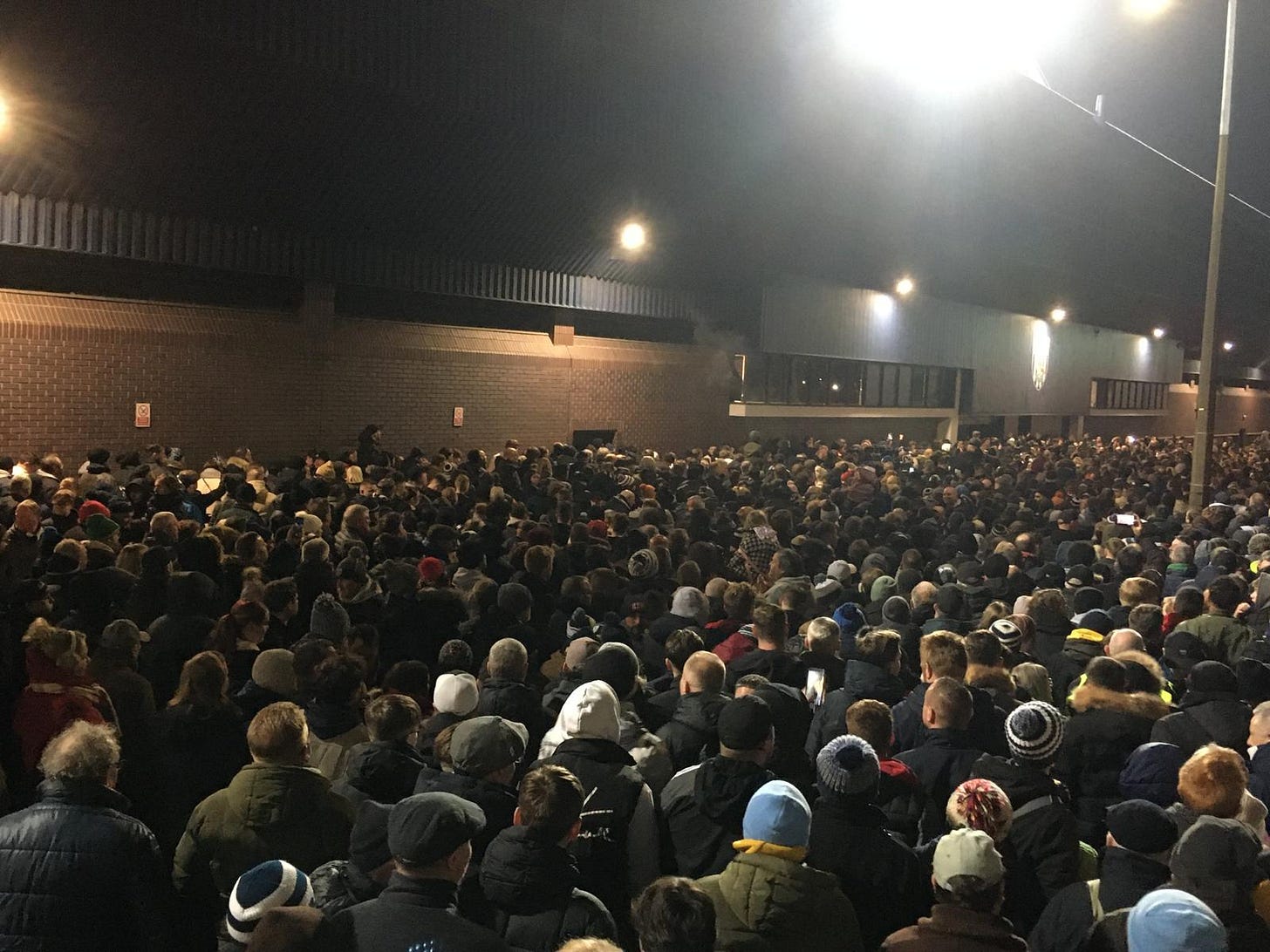Want to know why I’m writing a book about football called ‘Where’s The Money Gone?’ Here’s the latest draft extract of my introduction. A longish read for the Bank Holiday…
It’s 12 minutes past eight on a gusty night at The Hawthorns, home of West Bromwich Albion.
In the deserted streets outside, paper bags are playing kiss chase; inside I’m shivering in my usual seat, high up behind the goal in the Birmingham Road End.
It’s only the start of November, but as the winds howl, it’s impossible to avoid the icy breath of winter. Long johns and thermals haven’t done the trick, and I’m hugging myself to fend off the cold.
But here’s something to warm me up; and it’s not out there on the pitch where The Baggies are tentatively embracing new coach Carlos Corberan’s tactical sophistication.
What’s thrilling me is the sight, in every stand, of supporters standing arms aloft and waving the torchlights from their mobile phones.
It’s like the encore of a rock gig, but you know you’re not watching Bruce Springsteen or Coldplay because in the next moment, a different kind of song erupts.
Thousands of voices in earthy shades of West Midlands accent join in unison: “Fuck Goo-chan Lie, Fuck Goo-chan Lie, Fuck Goochuan Lie, Fuck Goo-chan Lie, Fuck Goochan Lie”
Not exactly Wordsworth or Keats, but simple and effective. A direct blast of anger at the absentee landlord in charge at West Brom.
We’ve been here before, of course. What football fan of my grey haired vintage hasn’t?
One of the principal reasons I got into journalism in the first place was anger at the apathy shown, especially by national media, towards the threat of extinction faced by many of our traditional football clubs.
This was the mid-to-late 80s, and by way of response, I created ‘Off The Ball’, a homemade football magazine, hoping it would provide a rallying point for dissent.
The inspiration was the original punk fanzine ’Sniffin’ Glue’ had done a decade earlier, and ‘The End’, an independent style and politics ‘bible’ ‘produced in Liverpool.
It was an era when, as a Baggies fan, I donated to bucket collections to help save our despised local rivals Wolves, who’d fallen into the clutches of two hapless Manchester-based property developers, the Bhatti Brothers,
Their Molineux stadium fell into such a state of disrepair that only two sides remained open.
This was a local example of a national trend. The game was riddled with rogues and chancers. At various points in the same decade, supporters of Walsall, Fulham, QPR, and Reading all rose up in protest, fearing the demise of their football club, or a move from its traditional home.
The game’s administrators talked airily about “natural wastage”, a euphemism for allowing clubs to die.
Among those who reported on the game, there was apathy. Who cared if a few clubs went to the wall?? Not the papers, not the FA, not politicians.
That, at least, was how it seemed.
The 80s was an era when football headlines were dominated by stories of hooligan gangs kicking lumps out of each other.
Football violence was a real thing, and I would never seek to minimise it. Not after witnessing Leeds supporters toppling the fence in the away end at The Hawthorns and rioting after a defeat in 1982 which all but consigned them to relegation.
I was there when Millwall kicked off at The Hawthorns during a League Cup game the following year and was grateful to get home in one piece.
Matchday aggro was real and scary, but what nobody seemed to be railing against with equal vigour - certainly no mainstream journalist or MP - were the ‘hooligans in the boardroom’ who were hellbent on destroying the traditions of the game.
These were the directors and administrators who talked up football’s problems and talked down its loyal followers.
I wanted to challenge the idea that business interests should be allowed to trump supporters’ wishes.
The sense that a football club had intrinsic value was something I instinctively believed, especially at a time when the working classes were losing so much of the industry that had otherwise given them an identity.
I lived on a council estate in South Birmingham. My Dad was made redundant in the early 80s when the hardware company he worked for was closed down, and we feared he might never work again.
Manufacturing had been the bedrock of West Midlands employment. Now, the nuts and bolts of our economy were being literally shipped abroad.
Elsewhere, the coal mines and steel works were disappearing. And now they wanted to destroy our Saturday afternoons too? Come off it.
This was the pre-internet age, when we relied on the press and radio for our football information.
These outlets sometimes carried stories about football’s boardroom machinations, but their reporters conveyed little of the anger that inspired me to start bashing at a typewriter.
Quite the opposite. The papers, especially the nationals, were generally hardline Thatcherites, embracing the notion that money talked loudest and other voices should be ignored or even silenced.
It puzzled me that in Margaret Thatcher, we had a Conservative Prime Minister who seemed to care nothing for ‘conserving’ a game that had been a pillar of English society for more than a century.
She seemed oblivious to football’s social and cultural value. She only saw it as a law and order issue. Unruly supporters could be put down with the same force as striking miners or print workers.
In the context of the time, it should be pointed out that although my own team West Brom were about to slide into an abyss of mediocrity for an entire generation, ‘dodgy’ owners weren’t the problem at my club.
Incompetence may have been an issue, but corruption? Hardly.
In 1986, we lustily sang “Sack The Board” as Albion sank into the old Second Division with barely a whimper, registering just four wins in the entire season.
We were at it again just five years later when, trapped in the quicksand of failure, we slipped to the third tier of English football for the first time.
Baggies fans paraded a coffin around Shrewsbury Town’s Gay Meadow symbolising the ‘death’ of our club.
We remained outside the top flight for an unprecedented 16 years, but our owners were well meaning throughout. They were fans. They cared.
WBA supporters protest outside The Hawthorns.
What was happening by the autumn of 2022 felt different. There were fears that Albion were controlled by people who had no understanding of our heritage, and no regard for our tradition. They never even came to our games.
As performances deteriorated and troubling details of our accounts emerged, it became clear that something was going very wrong.
Instead of investing, our owners were taking money out of the club to prop up their ailing businesses elsewhere. Loans were secured against the stadium. Going bust felt like a distinct possibility.
This wasn’t a one-off event confined to Black Country, either.
Our plight was replicated throughout the country and was symptomatic of English professional football as a whole.
Bury and Macclesfield had gone bust. Plenty of others had staved off liquidation only to be hobbled for years by the disastrous consequences of overspending, including Portsmouth, Derby County, Reading, Wigan, Bolton
Desperate for the riches of the Premier League, numerous clubs had become locked into a financial arms race that, for most of them, was bound to end in tears.
At the top level, the threat of a breakaway European Superleague which would have guaranteed its founder clubs a permanent place without the threat of relegation, only confirmed what many of us already knew.
That football was a game increasingly controlled by, and for, mega rich owners rather than the supporters and communities who had sustained it for generations.
There was a ferocious backlash from fans who took to the streets in protest and forced a speedy retreat from the Superleague plan.
But it was a moment which crystallised the question - who now is football for? And what is its primary purpose?
Does it exist to advance the interests of hedge funds, oligarchs and oil states?
Or is it an extension of community and neighbourhood, an exemplar of civic virtue as well as a source of local pride?
Seeing fans metaphorically square up the suits carried echoes of the mid 1980s, even though in many ways football has been transformed in the decades since then.
One key difference was the response of politicians. At the time of the Superleague plot, instead of siding with big business, the government promised to introduce an independent regulator to curb the excesses of the game’s directors.
This reflected how football had gone mainstream and become respectable. Politicians were keen to bask in its reflected glory.
The breathless hype of Sky’s Premier League coverage told us we were watching the greatest games in the best competition in the world.
Live attendances were on an almost continuous upward curve. Those who went to games were more likely to be women and/or come from an ethnically diverse background. The LGBT community was thankfully celebrated, not mocked.
There were record amounts of cash being generated from broadcasting rights, too.
All in all, football was a success story, a money making global export and a hugely effective expression of British soft power abroad.
Yet this only highlighted the absurdity of the acute financial distress my club and many others found themselves in.
Football had never been wealthier or more popular; yet it was stalked by the spectre of financial ruin.
As a supporter, I wanted to protest at this state of affairs. As a journalist, I wanted to discover how it had happened.
To answer those questions, I’m on a personal odyssey through English football, talking to fellow supporters, club directors and others with inside knowledge of the game.
In the words of a well worn terrace anthem, I want to know: “Where’s The Money Gone?”




